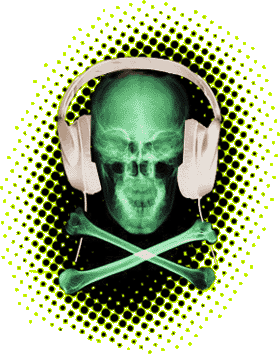
The new Foo Fighters album is out. Not in your local Tower Records, of course -- it's not supposed to be released for another three weeks. But so what? The new album is already available for nothing, thanks to the new wave of homebrew piracy: organized MP3 "groups" dedicated to free trade online.
Privateers like Apocalypse Production Crew (APC), Rabid Neurosis (RNS), and Addicted to Music (ATM99) are dramatically shaping the distribution of music online and off. Competing for nothing more than bragging rights, groups like these rush to release high-profile albums weeks before their official release dates, handing them out for free to anyone who wants them.
Unlike the lone teenager in his college dormitory, these groups are organized, efficient and prolific. For example, the information files (known as NFO files) packaged with every RNS release includes the claim that they emancipate "an average of nearly 6,000 releases per year." Groups get the CDs for free wherever they can -- early shipments to music stores, radio promos or even buy them the old-fashioned way. Within hours, the music is saturating an elite network of FTP sites and Internet Relay Chat (IRC) file servers.
Wondering if a particular album has been "ripped" yet? It probably has. Try searching for it in MP3 Check, the most thorough database of pirated CDs and an essential tool for the experienced trader. By compiling several lists of current MP3 releases, groups can see if a CD was already released by a competing group. The MP3 HQ site provides a scorecard for this global game, tallying daily releases to see who rules the MP3 scene.
These Web sites list every new release, but of course they don't host any MP3 files or tell you where to find them -- nowadays, finding any commercial albums on the Web is downright impossible. All the real action happens in IRC, a massive chat network where thousands of people hang out daily, talking and trading files. Most of the major groups have IRC channels devoted to their "fileservs," which offer up a steady stream of MP3s. It's not unusual to find around 200 people in each channel at any given time.
Maintaining a high level of quality requires organization. So late last year, several of the major groups formed a council called the "RIAA," a sarcastic poke at the Recording Industry Association of America. A treaty, signed by representatives from five major groups -- "Vega (aPC), Aeonizer (Kain) (ATM), AlCapone (RnS), Exx (UMA), Fido (AMOK)" -- lists several proposals to ensure a high standard of quality in the MP3 scene, and urges that the standards be adopted by every group.
Though members from RNS and APC declined to be interviewed, the information file bundled with Marc Anthony's debut album shows APC's distaste for media attention:
"We would like to request that the various 'scene news' Web sites please refrain from posting this NFO up in non-protected areas. Our work is intended for private FTP sites and the scene in general. It is NOT intended for viewing by members of the government, software companies, law enforcement, AOL members, and other undesirables."
So don't tell anybody, okay?
Disclaimer: Downloading commercial albums is illegal. GettingIt does not endorse this sort of behavior, even if it's really, really fun.
Andrew Baio has never downloaded an illegal MP3, he's never inhaled, and he's not the new Art Director at GettingIt.
